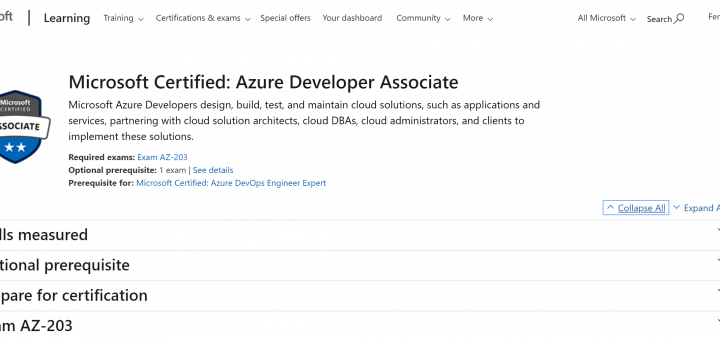Microsoft Certified Azure Developer Associate – Exam AZ-203

This post is part of the series Microsoft Azure Certification - AZ-203
As I mentioned in a past post, Microsoft revamped its Azure Certification, and now, we have eight different role-based certification paths.
This role-based approach allows developers to select their track and pursue specific certifications based on their needs.
In my case, I decided to start with the Microsoft Certified: Azure Developer Associate, my company requires an active developer role, and I want to make sure I follow best practices.
According to Microsoft
Microsoft Azure Developers design, build, test, and maintain cloud solutions, such as applications and services, partnering with cloud solution architects, cloud DBAs, cloud administrators, and clients to implement these solutions.
The amount of skills measured in this certification is significant and available in the following link
To summarize a Certified Developer must be able to:
- Develop for cloud storage
- Create Platform as a Service (PaaS) solutions
- Secure cloud solutions
- Develop for an Azure Cloud Model
- Develop Azure Cognitive Services, Bot, and IoT solutions
- Develop Azure Infrastructure as a Service Compute Solutions
- Develop for Azure storage
- Implement Azure security
- Monitor, troubleshot, and optimize solutions
- Connect to and consume Azure services and third-party services
This certification assures that you have previous knowledge of C#, Understanding of key concepts like Databases, Web applications, Rest API’s as well as have some experience using the Azure Portal and PowerShell
Microsoft emphasizes that an important starting point for a novice or a seasoned developer, is the Microsoft Certification named “Azure Fundamentals” it helps prove your knowledge of the fundamentals of cloud security, privacy, compliance, and trust. I’ll skip it for now but get back to it later.
Why do you need to get certified?
In three simple steps
1) There is a massive demand for skilled developers
2) High usage of Microsoft Azure, more and more companies are migrating their services to the cloud
3) Higher compensations and professional satisfaction
A certification validates and gives companies working with you a higher degree of trust.
Once we understand the objectives, it is time to cover the first chapter of the certification!




